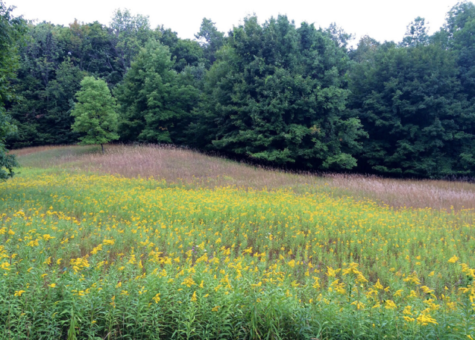How to Beat the Spring Allergy Season
March 22, 2018
As spring comes and flowers begin to bloom and rain begins to fall, allergy season is also on the way. With the pollen in the air and the mold from the rain causing stuffy noses and watering eyes, here are a few ways to try to beat this allergy season.

One way to beat this allergy season is to start preventing the allergies earlier rather than later. Bela Faltay, Chief of Service of Allergy at Akron General Health System, said that when you start medicating early it will help ease the symptoms during the spring season. If you start a week or two ahead of time, it may help you feel better all season. Faltay states that decongestants work fast but can sometimes make your symptoms worse if you overuse the medication. To stay safe, you should stop using decongestants after three days.
Another way to survive this allergy season is by limiting the time you spend outside. Every spring, trees release pollen into the air. As you breathe, you inhale these particles into your nose and lungs which can cause an allergic reaction. By staying inside, you can reduce the amount of pollen you inhale. Webmd states that on windy days and during the early morning hours is when pollen counts are the highest.
In addition, there are many natural remedies to beating seasonal allergies once the symptoms begin. Doni Wilson, member of the American Association of Naturopathic Physician, says that natural supplements such as nettles and plant pigment called quercetin can help to relieve allergy symptoms such as runny nose, watery eyes, and hives. Quercetin helps prevent immune cells from releasing histamines that cause allergic reactions, according to the University of Maryland Medical Center. Another natural remedy is taking vitamin C.
Dr.Wilson states, “Even something as simple as vitamin C can help. It’s a natural antihistamine, but it’s very gentle—you need to take 500-1000 mg., three times a day to reduce symptoms.”
Taking medicine can further your chance of surviving this allergy season. Dr. Kao, director of research at the Allergic Disease & Asthma Center, says “try switching to other brands and types until you find the right fit and combination.” Medicine, such as decongestants, can help relieve a stuffy nose and antihistamines can reduce sniffles. It is suggested by Everyday Health that if you take the indicated medicine and it does not work, your metabolism may not be right for the medication.
Furthermore, there are multiple types of over the counter medicine to fight spring allergies such as Claritin, Flonase, and Allegra. Flonase states that taking the nasal spray daily can provide all day relief from congestion and other allergy symptoms. Today said for the beginning of congestion, runny nose, or sneezing, you should take less drowsy antihistamines such as Zyrtec, Allegra and Claritin. Maria Marzella Mantione, spokesperson of American Pharmacists Association and clinical professor at St. John’s University also said that Benadryl or ChlorTrimeton can work. When taking these medications, it is smart to take them often. Benadryl and ChlorTrimeton can make you drowsy, so the best time to take them is before bed.
When it comes to allergies, everyone reacts differently to seasonal changes. Assess what you need and identify if your symptoms are allergy related or sickness.




